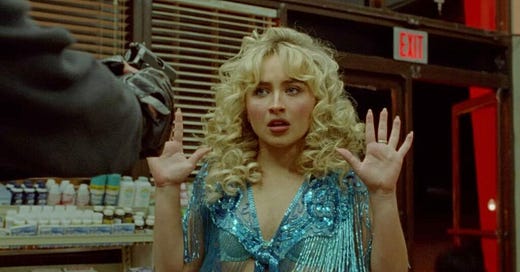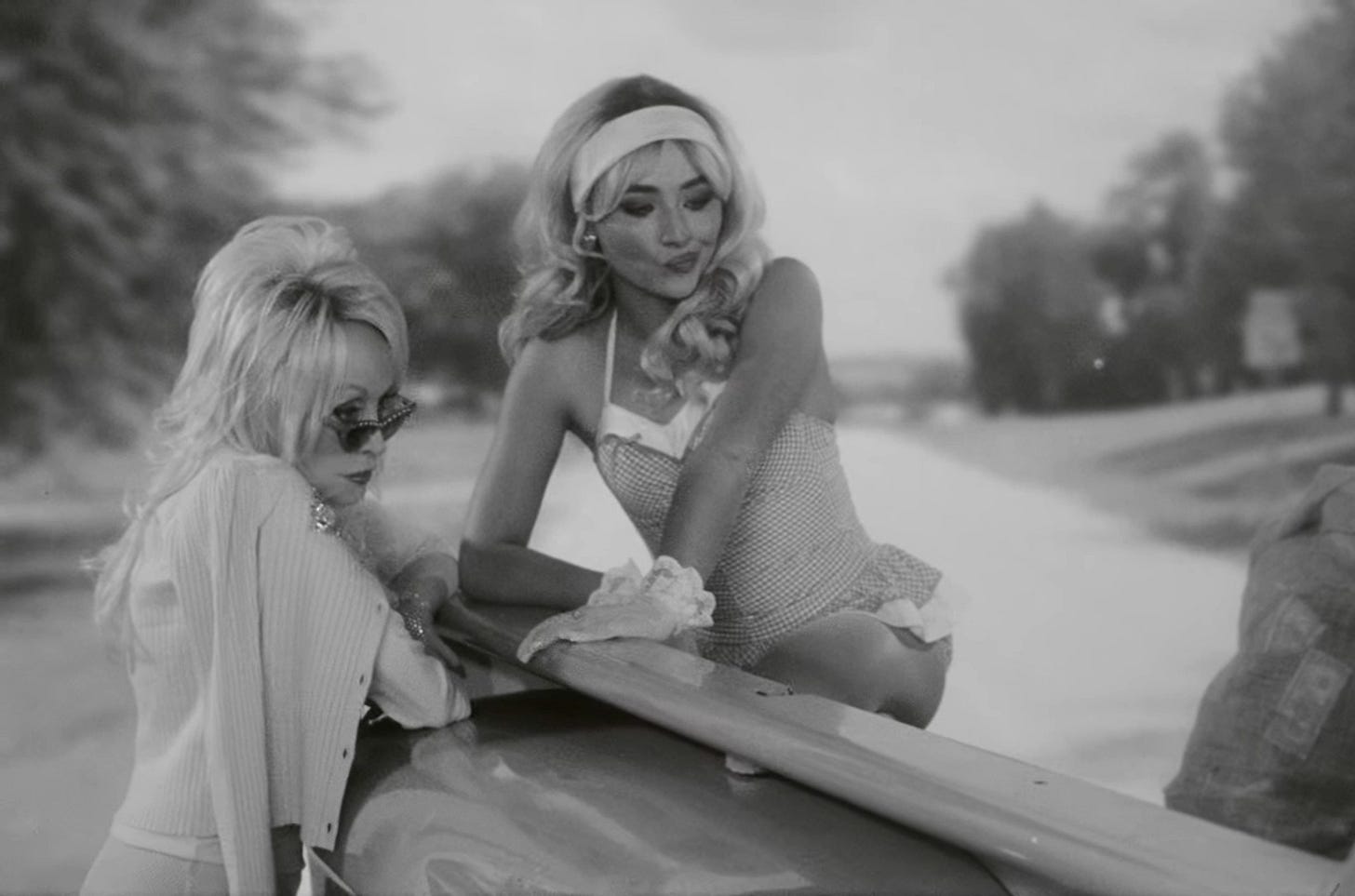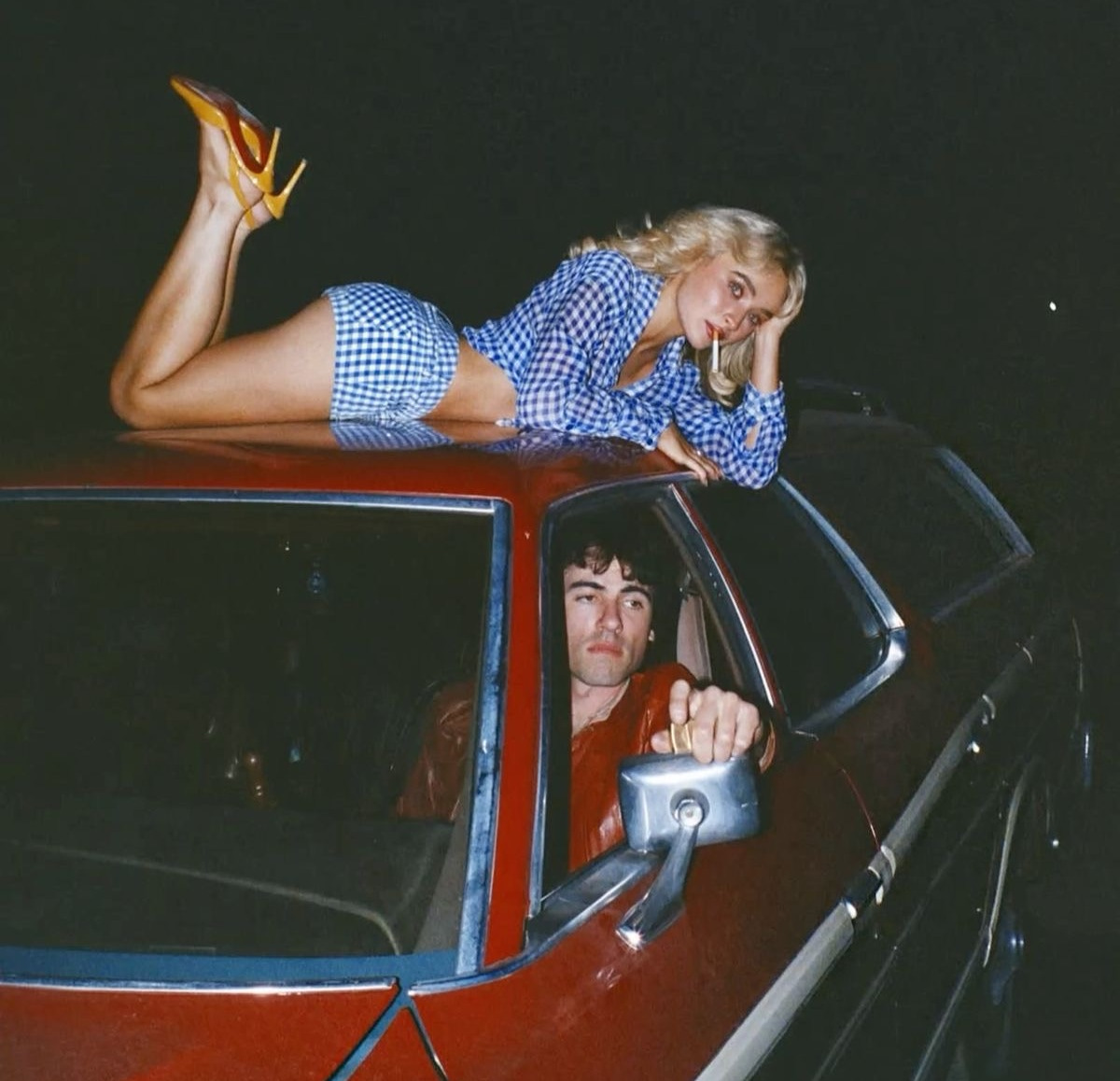Men don’t even like Sabrina Carpenter
if she’s performing for men, let’s just ask them what they think
Most discussions on Sabrina Carpenter orbit the same well-worn questions: Is she feminist or not? Is the “sweet little girl” image ironic, or are we regressing? Is she performing for the male gaze or the female one?
And though these question are important, they often speak around male desire, rather than directly to it.
Instead of decoding Sabrina Carpenter through abstraction or feminist theory, I wanted to observe her through the very audience she’s supposedly performing for. I wanted to simply ask: What do men actually see when they look at her? What do they think when they see this persona?
I started where the average straight man tends to make his opinions known: online forums. Unsurprisingly, there was lots of discussion on Sabrina Carpenter. But it wasn’t quite what I was expecting.
These men hate her.
Not mere dislike, but a visceral contempt that seems disproportionate to the harmlessness of the subject.
One female commenter said her male partner had experience with women “like” Sabrina Carpenter:
“…due to him dating someone extremely similar to Sabrina’s persona in his past (a 4’11, extremely hyper-sexual, attention seeking, narcissistic woman) he cannot stand her…’it’s like I already know who her fans are by looking at her. she’s what hard-core Christian girlies live vicariously through as she does her version of “risqué”’ (which is why it’s not ever sexy, it’s like what someone who has never had sex would assume is sexy)
He tells me that any man worth his salt is not going to find the ideology of what Sabrina is marketing as attractive, only the most insecure man would…[he] finds it insulting to his intelligence as a man and that this marketing strategy is for the lowest critical thinking population. He reiterated to me that not all men only think with their dicks and it feels insulting to be written off/painted that way, even for marketing purposes.”
Another male commenter had a similar point to make about a previous girlfriend in comparison to Sabrina:
“I dated a girl once who was under 5', and she wasn't like this at all. I'd find Sabrina attractive if she had a better personality and didn't do all the gross shit. Sex-positive music made by women is fine, but Sabrina doesn't do it tastefully. You'll get right wingers who act like a child merely seeing a queer person is grooming. Then you have Sabrina doing much worse for an audience with lots of children, but it's totally fine because she's soooo straight.”
A surprising number of male commenters made the recurring—and almost disturbing—comparison between Sabrina and their high school girlfriends. Specifically, the ones that they felt dressed older and acted more sexually experienced than they actually were. One man remarked: “She reminds me of my high school girlfriend a bit in that her sexuality is over the top.” Another wrote that his ex “was inexperienced but tried to be the cool girl like Sabrina Carpenter.”
A common critique was that they felt Sabrina’s sexual persona was entirely fake. One said, “Her overt sexuality is over the top and not who she naturally is”. Another replied, “The fake persona is something that actually resonates with the population, unfortunately. Nobody talked about her before the fake tan and wig”.
Another forum I found was one discussing the music video for Sabrina’s Please Please Please ft. Dolly Parton. In the video, Sabrina and Dolly are driving around with a man tied up in the trunk of their car. And it seemed like the men didn’t really like that.
“This ‘woman’ is disgusting. She often glorifies and arguably encourages the killing of men. She should be de-platformed. But instead she’s put on a pedestal…”
“Sabrina Carpenter is disgusting, over-sexualized trash…That she’s the leading pop icon says much ab out the state and degradation of society.”
It’s interesting that these reactions don’t seem to support the current feminist critique of Sabrina’s persona so much as violently overcorrects it. Where feminist thinkers might call her image commodified or regressive, these men blow those concerns into accusations of moral collapse. Sabrina’s performance isn’t only tasteless, but responsible for “the pornification of society”, for corrupting children, for emasculating men.
But what makes these responses worth examining isn’t just their blatant misogyny, it’s how obsessed they are with control. These men are not unsettled because Sabrina is pandering to them, they are unsettled because they think she isn’t. They consider her image to be performing sexuality on her own terms (however curated those terms may be). They don’t even feel that the intended audience is them, but cheering crowds of women.
“…a pornified oversexualized industry plant who mimics giving oral sex at her shows while crowds of women cheer it on. How braindead is society to applaud this kind of behavior and even call her music art.”
“As I male I don't see how an image of a woman being treated badly is catering to us at all…its disgusting”
These comments are less interested in structural questions—like why these tropes persists or who they serve—and more in disciplining the women who refuse to play by the rules they feel entitled to enforce. They don’t want Sabrina to be more complex in her message, they want her silent, covered, and gone.
Many of these conversations echo discussions in feminist spaces that debate whether Sabrina is catering to the male or female gaze. Men seem to have a lot to say about the pop star’s physical features and if she’s even “attractive” enough to cater to the male gaze.
“She’s a petite blonde with a constant face full of makeup and full hair that wears tight fitting clothes including lingerie with sex kitten heels. She’s classic male gaze.”
—”Yes, that would be classic male gaze. But popular opinions have changed. It's more Scarlet Johansson in the red dress (years ago). Or Tate McRae. Hot but looks like they'd be the "cool gf" and watch football.”
“…thought she was plain, and too ‘influencer’ like…”
“She got big eyes that look close together in some pics, a long witch-like nose with a tip that dips inward, and a pointy chin. She looks like a garden gnome with makeup and a wig.”
What’s striking about these comments is how unstable the concept of “the male gaze” becomes when actually confronted with a real woman. On one hand, Sabrina is immediately pegged as a “classic male fantasy”—petite, blonde, sexualized. But then she’s dismissed for not being the right kind of fantasy. Her femininity is dissected into parts and found lacking.
There were even large amounts of comments transvestigating her, insisting that she’s not a “proper” female due to her persona and her constant “man-hating” depictions. One commenter said, “I’m 100% certain that she’s actually XY or XXY or some other genetic defect. Not properly XX female…That thing is not a woman. I’m not even sure it’s human.”
It’s a disturbing escalation, but it also exposes some important points. If men see a pop star accused of weaponizing hyper-femininity and decide that she isn’t even feminine enough to be a “real” woman, then the idea that she’s catering to their gaze beings to unravel.
The contrast between what is “authentic” and “artificial” femininity emerges again and again in these spaces. While they deny Sabrina’s womanhood, they offer up an example of femininity done “right”: Sydney Sweeney.
Her name appears frequently in these discussions. In many of these male-dominated spaces, the two are held up against each other in comparison. Where Sabrina is framed as “trying too hard”, most men describe Sydney as “effortlessly seductive”. Where Sabrina’s sexuality is seen as “performative”, Sydney’s is viewed as innate. The subtext isn’t just about physical appearance, but about who seems to embody desire versus who appears to manufacture it.
“Women are more likely to recognize sydney being more male gaze because her figure is envious and conventionally caters to the male fantasy, while sabrina…has an nonstandard ‘ideal’ body type, so women are not threatened by it…sabrina's body is attainable and not out of reach…she poses no real threat to their insecurities. Being average and relatable looking will always make people feel like you're part of their clique, and thus makes it easier for them to like you.”
“Women like sabrina because she’s not sexy and is therefore non-threatening. women hate sydney because she is beautiful and has the body that men stereotypically love, and that makes her a threat.”
Once again, fascinatingly—and perhaps inconveniently—these reactions still don’t seem to align with mainstream feminist critique of Sabrina.
These men aren’t exactly fawning over the “over-sexualized” and “infantilized” image she’s portraying. In fact, many seem to be expressing open disdain towards her aesthetic. They accuse her of “trying too hard”, of being “inauthentic”, of lacking the natural sexual magnetism of someone like Sydney Sweeney.
“She is not even that pretty in most men’s opinions. She is such a pathetic human…”
“All she does is sexualize herself instead of being talented, she has the shaming coming…if conservatism means being decent and having dignity, then what’s wrong with it.”
Men appear to be repelled by what feels like a performance that neither satisfies traditional fantasies nor invites admiration. The critiques are that she’s apparently trying too hard to be sexy. And failing.
Even when women seem to cater to male fantasies, there is no guarantee of reward. Sabrina reflects many of the visuals associated with heterosexual male desire through her makeup, clothing, and overt sex appeal. And, yet, she is mocked and dismissed by the very audience she’s supposedly pandering to. This is the deeper and more uncomfortable truth that many feminist readings overlook. The male gaze doesn’t merely desire women, it disciplines them. It will still dehumanize the same women it supposedly desires, especially when that desire is seen as not “earned” through authenticity. In this way, the idea that appealing to men as a strategy of power collapses.
What we’re seeing isn’t a universal male gaze being pandered to. It’s a fragmented, hostile field of projection and paranoia. This isn’t evidence of a successful seduction. This is evidence that the male gaze isn’t a reliable compass for understanding the power dynamics of pop culture. At least not in the neat, linear way many feminist critique assumes.
What I’ve realized after exploring these male-dominated spaces is that the problem isn’t that Sabrina Carpenter is appealing too strongly to men—it’s that she isn’t appealing to anyone in a way that feels legible.
She isn’t universally embraced by men or women. She isn’t erotic in the traditional male gaze sense, nor empowering in the fourth-wave feminist sense. And it seems those contradictions are what make people uncomfortable.
Feminist critique often argues that her persona threatens to sell submission as empowerment. There is a fear is that she’s feeding a male fantasy under the guise of feminine control.
But many men don’t seem to read her image that way at all. For them, sex appeal is legible when it follows a recognizable script—the “cool girlfriend” or the “effortless hot girl.” When a performance doesn’t map neatly onto those expectations, it becomes uncanny. Sabrina’s blend of schoolgirl naivety and performative raunch reads as forced to them.
Women, too, seem conflicted. Some praise her for being “for the girls”; others dismiss her as unserious or inauthentic. But both sides of the critique seem to rely on the assumption that someone finds her image compelling, that there is an audience being successfully seduced. Yet it seems that audience is hard to locate.
She performs femininity in a way doesn’t cater to any stable fantasy. She’s not sexy enough to be a bombshell, not innocent enough to be a Lolita, not ironic enough to be camp. And it’s that very illegibility that frustrates people. I don’t think she poses a threat because she’s successfully seducing the masses, I think she poses a threat because no one can quite figure out who, exactly, she’s catering to.
Feminist discourse imagines straight men as the intended consumer of Sabrina Carpenter’s performance. But after reading hundreds of these kinds of posts, I honestly believe her significance in those spaces is vastly overstated. She doesn’t seem to be widely consumed as a male fantasy. Instead, she’s being rejected. Or worse, fixated on as a target of their contempt.
That’s not to say that no men sexualize her. The internet is large, and the male gaze is too pervasive to pretend that such a performance goes entirely unnoticed or unconsumed. There are certainly corners of the internet where her sex appeal is taken at face value. But these aren’t the voices shaping the broader cultural tone. In the spaces where male attention is supposed to be at its most primal, what I found was revulsion and paranoia.
It suggests a much more layered reality to this discourse. Sabrina Carpenter’s persona might have been designed to attract men, but it seems to thrive almost exclusively in female and queer cultural spaces. She doesn’t seem to resemble a blueprint of heterosexual male fantasy so much as a symbol of femininity that lives largely outside of it.
And, so, the panic around her appeal to the male gaze starts to feel less like an analysis and more like projection. It feels less about what men are actually thinking, and more about what women fear they might be. And, maybe, it’s also the unease that comes from watching a performance you can’t quite decode, from a woman you’re not sure was ever talking to you in the first place.










I feel that Sabrina performs a character for women in a similar way that drag queens do for queer people. She makes a hyperbole of topics that shape female lives (specially straight ones) like weaponized incompetence, performative sexuality and beauty standards, specifically those catered to men. She does this mostly through sexual motifs that feel more comical than they do erotic, in a way pointing to the how women are expected to be constantly made up and ready for sex. The utilization of sparkly outfits, over the top make up and wigs also caters mostly to women, who can find fashion inspiration or satisfaction in them. Even if I can understand the problematic with the infantile image she resources to, I can hardly find a way she would be appealing to straight men.
I reallyemjoy your writing but I do feel like the comments from men were very much cherry picked. What did it for me was watching Hasan Pikers stream (a section of it on youtube) where he discusses the sabrina debate and he simply stated there was nothing wrong with what she was doing, in the album cover or in her music THAT told me everything I needed to know about how much her supposed satire and message had flopped. He saw no issue with the misogyny at play or the degradation. That's an issue.